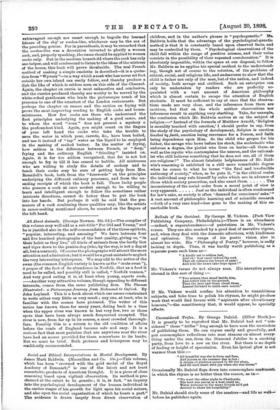Social and Ethical Interpretations in Mental Development. By James Mark
Baldwin. (Macmillan and Co. 10s.)—This volume, w hich has been "crowned with the gold medal of the Royal Academy of Denmark," is one of the latest and not least remarkable products of American thought. It is a piece of close reasoning based upon vigilant observation. Its method is pro- claimed at the outset to be genetic ; it is, in fact, "an inquiry into the psychological development of the human individual in the earlier stages of his growth for light upon his social nature, and also upon the social organisation of which he bears a part." The evidence is drawn largely from direct observation of children, and in the author's phrase is "psychogenetic." Ma. Baldwin holds that the advantage of the psychological-genetie method is that it is constantly based upon observed facts, and may be controlled by them. "Psychological observations of the child fall within the range of positive science, and their value consists in the possibility of their repeated corroboration." It is absolutely impossible, within the space at our disposal, to follow Mr. Baldwin as he applies his special method to the understand- ing, though not of course to the solution, of the problems of ethical, social, and religious life, and endeavours to show that the child is father not only of the man, but of the nation, and indeed of society, both savage and civilised. Such an enterprise can only be undertaken by readers who are perfectly ac- quainted with a vast amount of American philosophy which is almost certain to escape the attention of English students. It must be sufficient to say at once that the observe, tions made are very close, and the inferences from them are cautious, but that on the whole neither observations nor inferences result in anything very startling. Take, for example, the conclusion which Mr. Baldwin arrives at on the subject of religion :—" Instead of the formula of Matthew Arnold, 'Religion is morality touched with emotion,' I should prefer to say, from the study of the psychology of development, Religion is emotion kindled by faith, emotion being reverence for a Person, and faith being dependence upon Him. So the child who gropes for his father, the savage who bows before his stock, the ecclesiastic who enforces a dogma, the pietist who lives on herbs—all these, as well as the mystic who contemplates the unseen, and the rational- ist who still believes something that he does not see, all of them are religious !" The almost fatalistic helplessness of Mr. Bald- win's reasoning is exhibited in a still more remarkable degree when he comes to what he terms "the final and irreducible antinomy of society," when, as he puts it, "in the ethical realm the individual may rule himself by rules which are in advance of
those which society prescribes, and also exact them The inconsistency of the social order from a moral point of view is very apparent Just as the individual is often condemned for law's sake, so society is often damned for conscience' sake.'" A vast amount of philosophic learning and of scientific research —both of a very rare kind—has gone to the making of this re- markable book.


































 Previous page
Previous page